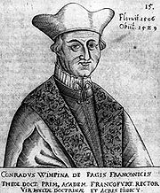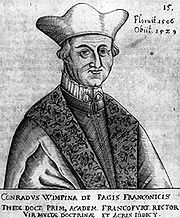
Konrad Wimpina
Encyclopedia

Buchen
Buchen is a town in Germany Neckar-Odenwald district, in Baden-Württemberg, Germany. It is situated in the Odenwald low mountain range, 23 km northeast of Mosbach.-Geography:...
in Baden
Baden
Baden is a historical state on the east bank of the Rhine in the southwest of Germany, now the western part of the Baden-Württemberg of Germany....
, about 1465; d. at Amorbach
Amorbach
Amorbach is a town in the Miltenberg district in the Regierungsbezirk of Lower Franconia in Bavaria, Germany, with some 4,100 inhabitants .- Location :...
in Lower Franconia
Lower Franconia
Lower Franconia is one of the three administrative regions of Franconia in Bavaria , Germany ....
, 17 May 1531) was a German Roman Catholic theologian and humanist of the early Reformation period. He was a quiet and stubborn conservative, considered quiet but somewhat narrow. In theology he was a pupil of Martin Polich of Mellerstadt and a Thomist.
Life
His family, whose name was Koch, came from Wimpfen on the NeckarNeckar
The Neckar is a long river, mainly flowing through the southwestern state of Baden-Württemberg, but also a short section through Hesse, in Germany. The Neckar is a major right tributary of the River Rhine...
, hence he was called Wimpina. He matriculated at the University of Leipzig
University of Leipzig
The University of Leipzig , located in Leipzig in the Free State of Saxony, Germany, is one of the oldest universities in the world and the second-oldest university in Germany...
(1479–1480) and remained there until 1505; in 1481 he obtained the baccalaureate
Bachelor's degree
A bachelor's degree is usually an academic degree awarded for an undergraduate course or major that generally lasts for three or four years, but can range anywhere from two to six years depending on the region of the world...
degree, and in 1485 was made magister
Magister
Magister is Latin for "master" or "teacher." It may refer to:* The Magister , an academic degreePositions or titles* A magister equitum, or Master of the Horse...
.
In 1491 he was made a member of the philosophical faculty, in 1494 rector, and in 1494–1495 dean. Having taken the theological course, he was made cursor in 1491 and sententiarius in 1494; in 1502 he received the degree of licentiate.
He was ordained at Würzburg
Würzburg
Würzburg is a city in the region of Franconia which lies in the northern tip of Bavaria, Germany. Located at the Main River, it is the capital of the Regierungsbezirk Lower Franconia. The regional dialect is Franconian....
, in 1495, as subdeacon, about 1500 as priest. He received the degree of Doctor of Theology from Cardinal-Legate Peraudi at Leipzig, 1503.
In 1505 Elector Joachim I of Brandenburg called Wimpina to Frankfort-on-the-Oder to organize the new university and to be its first rector; he was several times dean of the theological faculty.
From 1500–1504, in a dispute with his former instructor Polich, Wimpina defended theology and Polich poetry, each attaching the other with exaggerated and personal abuse. Wimpina was one of Martin Luther
Martin Luther
Martin Luther was a German priest, professor of theology and iconic figure of the Protestant Reformation. He strongly disputed the claim that freedom from God's punishment for sin could be purchased with money. He confronted indulgence salesman Johann Tetzel with his Ninety-Five Theses in 1517...
's first opponents. In 1518 he defended the legend that St. Anne had three husbands in succession and had a child Mary, by each one of them (De d. Annae trinubio), against Sylvius Egranus, in whose defence Luther took part.
In the dispute over indulgence
Indulgence
In Catholic theology, an indulgence is the full or partial remission of temporal punishment due for sins which have already been forgiven. The indulgence is granted by the Catholic Church after the sinner has confessed and received absolution...
s Wimpina composed the theses which Johann Tetzel
Johann Tetzel
Johann Tetzel was a German Dominican preacher known for selling indulgences.-Life:Tetzel was born in Pirna, Saxony, and studied theology and philosophy at the university of his native city...
debated at Frankfurt
Frankfurt
Frankfurt am Main , commonly known simply as Frankfurt, is the largest city in the German state of Hesse and the fifth-largest city in Germany, with a 2010 population of 688,249. The urban area had an estimated population of 2,300,000 in 2010...
, 20 January 1518. These theses contained the doctrine of the Catholic Church, but on the question of indulgences for the dead maintained merely a Scholastic opinion, preached by Tetzel.
He received canonries in the cathedrals of Brandenburg
Brandenburg
Brandenburg is one of the sixteen federal-states of Germany. It lies in the east of the country and is one of the new federal states that were re-created in 1990 upon the reunification of the former West Germany and East Germany. The capital is Potsdam...
and Havelberg
Havelberg
Havelberg is a town in the district of Stendal, in Saxony-Anhalt, Germany. It is situated on the Havel, and part of the town is built on an island in the centre of the river. The two parts were incorporated as a town in 1875...
, and in 1530 took part in the Diet of Augsburg
Diet of Augsburg
The Diet of Augsburg were the meetings of the Imperial Diet of the Holy Roman Empire in the German city of Augsburg. There were many such sessions, but the three meetings during the Reformation and the ensuing religious wars between the Roman Catholic emperor Charles V and the Protestant...
as theologian of the Elector Joachim. At the Diet Wimpina, with John Mensing, Redorfer, and Elgersma, drew up, against Luther's seventeen Swabian articles, the "Christlichen Unterricht gegen die Bekanntnus M. Luthers". Wimpina was commissioned to confute the "Confessio Augustana" (Augsburg Confession
Augsburg Confession
The Augsburg Confession, also known as the "Augustana" from its Latin name, Confessio Augustana, is the primary confession of faith of the Lutheran Church and one of the most important documents of the Lutheran reformation...
), and took part in the disputation about reunion.
Afterwards, he accompanied the Elector to Cologne
Cologne
Cologne is Germany's fourth-largest city , and is the largest city both in the Germany Federal State of North Rhine-Westphalia and within the Rhine-Ruhr Metropolitan Area, one of the major European metropolitan areas with more than ten million inhabitants.Cologne is located on both sides of the...
for the election of King Ferdinand. He then retired to Baden.
Works
His first publication, "Ars epistolandi" (1486), and a poem in praise of the university and city of Leipzig (1488) are of little importance. In 1493 Wimpina claimed in the "Tractatus de erroribus philosophorum" that Aristotle was wrong in various propositions which disagreed with dogma. As rector he delivered several orations that show wide reading.He also wrote a series of treatises and held disputations against Luther's doctrine. His polemics are combined in the "Anacephalaeosis" (1528), one of the most complete refutations offered of Lutheranism
Lutheranism
Lutheranism is a major branch of Western Christianity that identifies with the theology of Martin Luther, a German reformer. Luther's efforts to reform the theology and practice of the church launched the Protestant Reformation...
.

